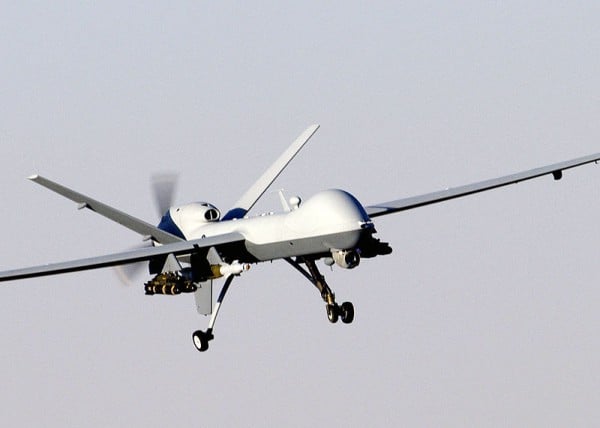
An MQ-Reaper drone in Afghanistan (U.S. Air Force photo)
James Fallows, writing in the January/February issue of The Atlantic, notes multiple disconnects between rhetoric and practice regarding the military:
“One: ‘honoring’ the troops but not thinking about them. Two: ‘caring ‘about defense spending but really viewing it as a bi-partisan stimulus program. Three: supporting a ‘strong’ defense but assuming that the United States is so much stronger than any rival that it’s pointless to worry whether strategy, weaponry, and leadership are right.”
Fallows makes a compelling case that this mindset makes us “more likely to keep going to war, and to keep losing, than one that wrestles with long-term questions of effectiveness.” He calls for steps to assess the conflicts we face, to rationalize our approach to using military force, and to improve our civil-military connections.
Better U.S. foreign policy coherence is also needed.
We ask the military to fix an extremely diverse set of problems. America faces many contentious situations, and we expect our forces to address all of them. In the wake of the attack on the Charlie Hebdo magazine, multiple voices call for war against violent Islamist extremism. But we also call for armed resolve toward Russia, China, Iran and North Korea. We have charged the military with cyber security. Each of these matters requires particular capacities, and each continually generates new challenges, from Russia’s “hybrid war” to jihadists’ online recruitment.
We also place no limit on what else we might ask. The military serves as our generic rapid response tool, most recently in dispatching troops to administer anti-Ebola programs. Thus, the services are constantly re-gearing for ever-novel missions, with new objectives and methods. They made rapid, heroic adaptations in Iraq and Afghanistan, inventing whole new categories of vehicles and developing new doctrines. But, if only because budgets have limits, we cannot continue to expect them to meet unpredictable, unlimited foreign policy demands.
Ineffectiveness is almost guaranteed if such radical discontinuity in missions, on top of cavalier use of force, remains the norm. To maintain military effectiveness, and for more fundamental reasons, we need to focus our foreign policy. A mechanistic list of countries and issues will not suffice; strategic documents today already provide unfocused “lists of desirable goals,” likely to shift with new developments.
Force is the ultimate sanction behind any assertion in international relations. Which assertions and demands would we fight for? One reason for our undisciplined invocation of force is that we indulge moralistic impulses without considering such questions beforehand. Answers that serve both our needs and our values will only follow from a guiding principle that sets foreign policy objectives and priorities.
That principle should be to validate America’s nationality as defined in the Declaration of Independence. The theory behind this principle, and of its interpretation for policy purposes, is more complex than would appear at first glance. Liberalism offers moral space for people to live by their own accord; it prescribes no creeds. This is harder to fight for than prescribed truths. But freedom’s nature implies a plausible strategic logic: to defend the tangible needs of American society, in realistic and uncompromising policies, taking care to promote freedom by example and facilitation rather than overt influence.
This logic provides a reference point for policy debate and formulation. Exact configurations will follow political decisions. But it will form implicit parameters and priorities for military action, to offer a basis for planning and organization.
As one illustrative new policy, the free societies largely comprise members of our closest alliances: NATO, U.S.-Japan and ANZUS. They are deeply democratic, and value freedom of expression and lifestyle. Their Liberalism depends on security against coercive violence and disruption of key needs and infrastructure. Much of the danger to those needs is either air, sea, space, or cyber based. The free world’s technological capacities currently render traditional armed threats nearly futile, and one role of the military is to maintain this near-immunity. This might be done, at reduced cost, in a collective defense arrangement among these allies. An explicitly defensive community would limit the scope for its interventions abroad, which will reduce perceptions of Western hegemony. Coordination in Liberalism’s defense would also portray free peoples collaborating in the name of freedom, countering ideological claims that Liberalism spawns dissolution.
Constituent principles, such as doctrine for ground deployments abroad, demarcation of external threats from domestic dysfunctions, or definitions of valid pre-emptive attacks, would follow from freedom’s strategic logic. Such clarity of purpose will best ensure public support for the missions we assign the armed forces. It makes long term planning more manageable, and battlefield success more likely.